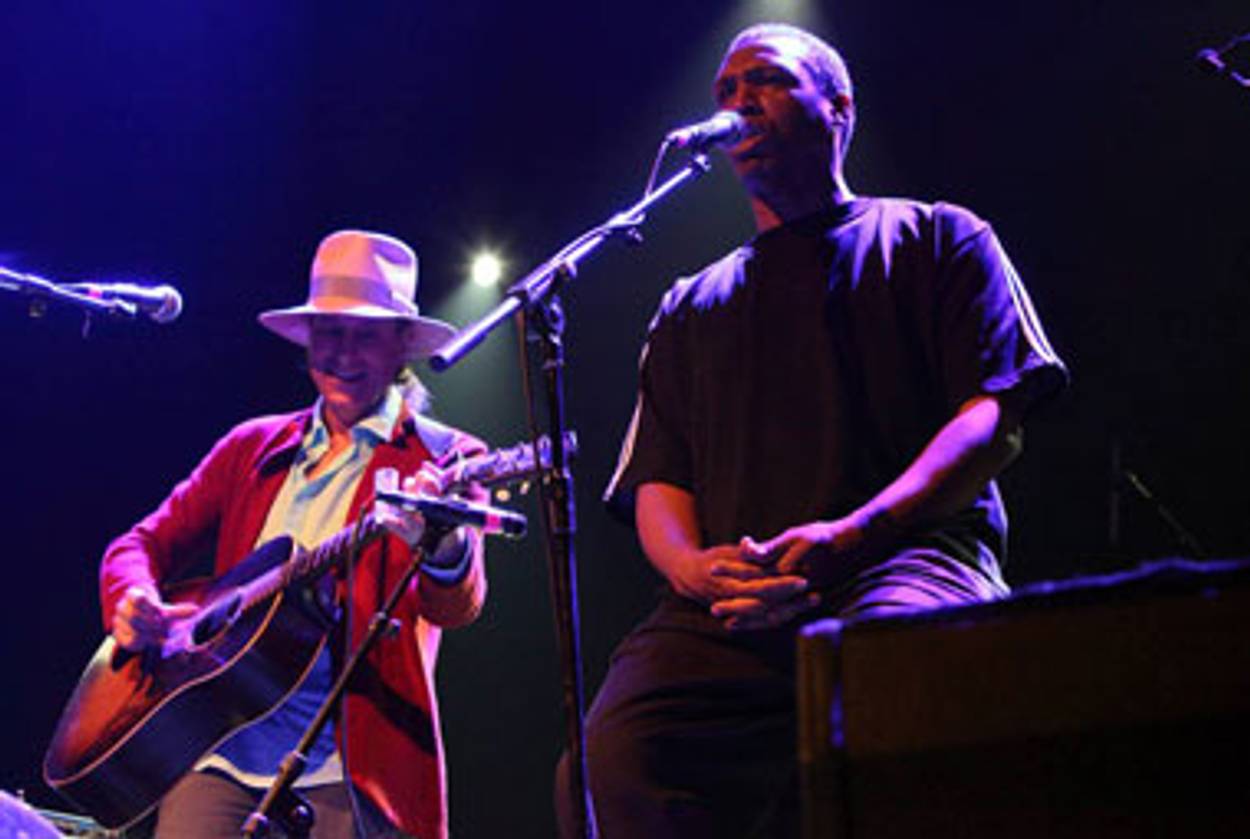Shades of Gray
Duo opens new chapter in the history of black-Jewish collaboration




As an African-American who counts a number of prominent Jews in his inner circle, but who nonetheless had to fight hard to win Jewish trust during his presidential campaign, Barack Obama pretty much embodies the historic relationship between blacks and Jews in America: sometimes close, sometimes fraught, and never, ever simple.
The same applies to the long-standing engagement between blacks and Jews on the playing fields of culture, and nowhere is this more true than in the realm of music. In the late 19th and early 20th centuries, the Jews who played such a conspicuous role in the music industry made as much money as anyone off material that trafficked in black stereotypes, from coon songs to vaudeville tunes. (If you want to see something really bizarre, check out this clip of Eddie Cantor in blackface.) And Leonard Chess (ne Lejzor Czyz), recently immortalized in the film Cadillac Records, has long held dual status as a champion of black artists like Muddy Waters and Howlin’ Wolf, and as a villain who made far more money from their labors than they ever did.
From a purely musical standpoint, however, exchanges between blacks and Jews have ranged from the benign to the transcendent. The same close contact between urban blacks and immigrant Jews in pre-World War II America that led an African-American jazz pianist like Willie “The Lion” Smith, son of a black mother and a Jewish father, to learn Yiddish and moonlight as a cantor at a Harlem synagogue in the 1940s, also led white Jews like trumpeter Ziggy Elman to mate jazz with klezmer, thus giving rise to freylakh swing. (In 1938, Elman, who came up playing in Jewish bands in Philadelphia and Atlantic City, recorded a swing arrangement of “Der Shtiller Bulgarish,” a tune associated with the Jewish bandleader Harry Kandel. Elman called his version “Freilach in Swing,” and Benny Goodman later had a hit with the same song under the title “And The Angels Sing.” Smith, meanwhile, once managed to startle the ordinarily unflappable Duke Ellington by lapsing into Yiddish on the David Frost show.) Even “traditional” klezmer grew apart from its Old World roots as a result of musical miscegenation with distinctly American (read: black-influenced) styles.
Jump forward 80 years or so, and you can see the same scenario playing out today. Scholar Jeffrey Melnick has noted that the postwar suburbanization of American Jewry eventually led to a growing social and cultural distance between blacks and Jews. In fact, Jewish music basically went dormant for several decades following the war. But Jewish music is thriving once again, and geographic proximity has been rendered irrelevant by digital music distribution. We live in an era of musical mash-ups, with Jews and blacks more closely connected than ever.
I’m not talking here about Jews who do mediocre reggae covers, or even pitch-perfect recreations of classic soul and funk. I’m talking about Jews who are combining elements of both Jewish and black music in fresh and innovative ways
Some artists, like those associated with Shemspeed and JDub—the DJs Diwon and Socalled, the bands Soulico and The Sway Machinery—mix and match klezmer, Israeli, and Arab music with soul, hip-hop, and afro-pop. Others, like guitarist Gary Lucas—a man who has played with everyone from Captain Beefheart to Frank London, and who has recorded his own Jewish-themed albums for John Zorn’s Tzadik label—and jazz/rock/gospel singer Dean Bowman, go deeper still.
Lucas, who is white and Jewish, and Bowman, who is black and not, have teamed up to form Chase the Devil, a duo dedicated to exploring “spiritual roots music,” a category that apparently includes Islamic qawwali but leans most heavily toward Jewish songs and Christian spirituals. Whether wending their way through a profoundly reharmonized verison of “Hine Ma Tov” or an otherworldly rendition of Blind Willie Johnson’s “Dark Was the Night (Cold Was the Ground)” (Johnson’s original recording was included on the golden LP carried aloft by the Voyager spacecraft), Bowman and Lucas are ecumenical in the extreme. Everything they touch is put through the same open-eared filter, with splashes of blues and gospel and avant-garde effects added like colors from a painter’s kit. The results are neither black nor Jewish in any meaningful sense, but illustrate yet again just how ravishing the offspring of those two traditions can be.
Political alliances are ephemeral, subject to the shifting tides of history, public sentiment, and corporate interest. But music, it seems, always offers a bed for sweet entanglements.
Alexander Gelfand is Tablet’s music columnist. His work has appeared inThe New York Times, The Economist, Wired.com, the Forward, and elsewhere.
Alexander Gelfand is a recovering ethnomusicologist, a sometime jazz pianist, and a former West African drummer. His work has appeared in the New York Times, the Chicago Tribune, the Forward, and elsewhere.
Alexander Gelfand is a recovering ethnomusicologist, a sometime jazz pianist, and a former West African drummer. His work has appeared in the New York Times, the Chicago Tribune, the Forward, and elsewhere.